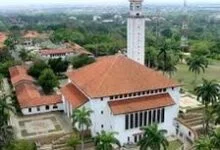Occupy Julorbi House Demo: Ghana Police Service Refute Claims Of 1 Protester Being Pregnant
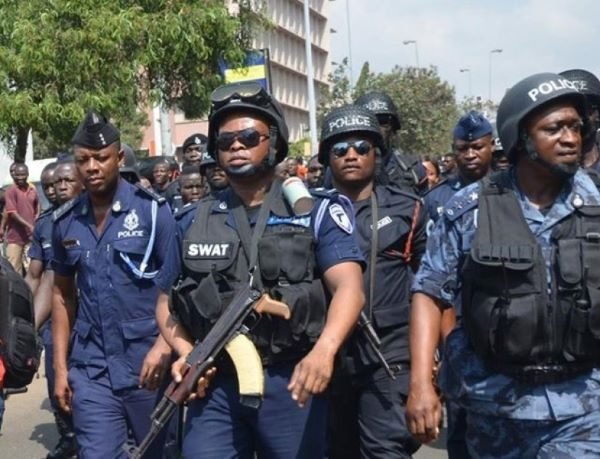
The Ghana Police Service has officially denied claims that a protester, arrested during the recent “Occupy Julorbi House” demonstration, is pregnant. This clarification comes after widespread public concern and criticism regarding the handling of protestors detained during the event, which was sparked by frustrations over illegal mining (galamsey) and worsening economic conditions. The protests have put forth a national conversation about environmental degradation, governance, and the right to peaceful demonstration.
The Roots of the “Occupy Julorbi House” Protest
The “Occupy Julorbi House” protests were largely driven by the devastating impact of galamsey and its environmental and social repercussions. Galamsey, the illegal mining practice in Ghana, has caused irreparable damage to the country’s rivers, farmlands, and forests. Water bodies such as the Pra, Birim, and Ankobra rivers, once crucial resources for drinking water and agriculture, have become severely polluted, posing a serious risk to public health and the livelihoods of communities.
In addition to environmental destruction, the country has been grappling with severe economic challenges. With rising inflation and a depreciating currency, many Ghanaians are struggling to afford basic necessities. These economic woes, coupled with what many see as government inaction against corruption and illegal mining, led to the rise of the “Occupy Julorbi House” movement. Citizens are calling for decisive leadership, environmental restoration, and better economic policies that serve the interest of the people.
The protestors, a coalition of concerned citizens and social activists, chose the name “Julorbi House” — a play on the official presidential residence, Jubilee House — to highlight their view that the government is disconnected from the realities facing everyday Ghanaians.
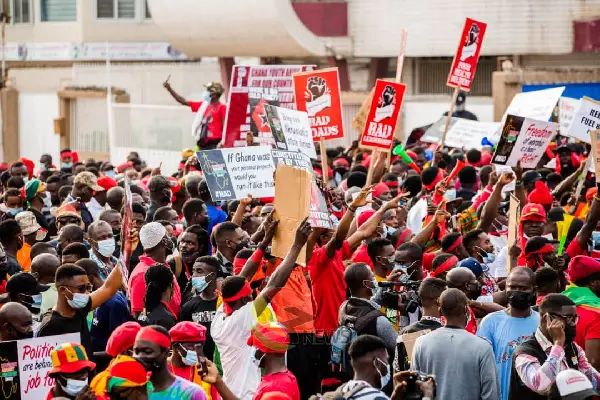
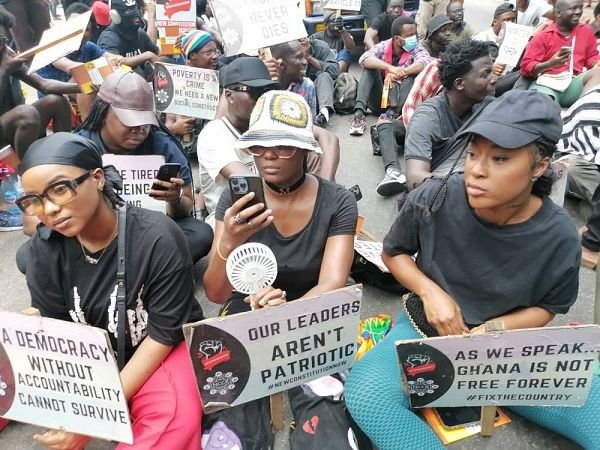
Police Response to Protest and Arrests
During the protests, which took place in Accra near the Jubilee House, several demonstrators were arrested for what the police described as illegal assembly. Among the arrested was a female protester whose case attracted significant public attention due to allegations that she was pregnant at the time of her arrest. These claims, if true, raised serious concerns about the well-being and treatment of detainees while in police custody, prompting outrage from human rights advocates and the public.
In the days following the arrests, social media erupted with calls for the police to address the issue, with many Ghanaians demanding transparency and accountability in the treatment of protestors. Civil society groups and political commentators echoed these concerns, adding pressure on the police service to issue a statement.
Police Denial of Pregnancy Allegations
In response to these allegations, the Ghana Police Service issued an official statement on [Date], categorically denying that the female protester was pregnant. According to the police, a medical examination was conducted, and it was confirmed that the woman was not with child at the time of her arrest or during her detention. The police assured the public that the health and safety of all detainees, including the female protester, were prioritized.
The statement read: “After thorough medical examinations, it has been confirmed that the arrested female protester is not pregnant. We advise the public to disregard any misinformation that suggests otherwise.”
The police emphasized the importance of relying on verified information, calling on the media and the public to avoid the spread of false rumors. The service also reiterated its commitment to upholding the law while safeguarding the rights of citizens during such operations.
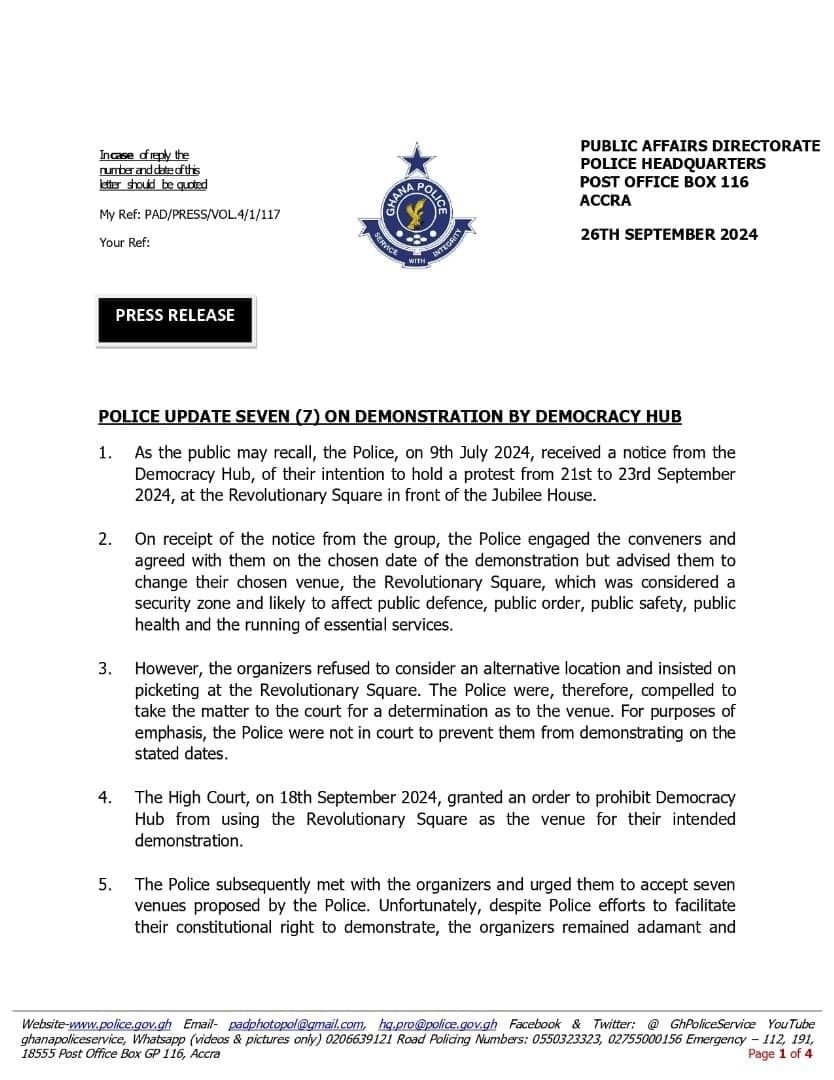
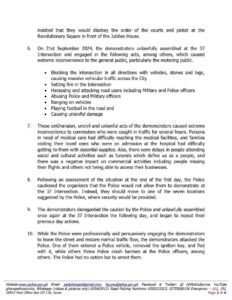
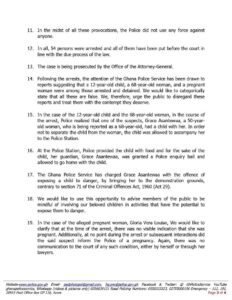

Public Reaction and Concerns Over Galamsey
Despite the police’s statement, public discontent remains high. The broader conversation around the treatment of protestors and the legitimacy of public demonstrations continues to stir emotions nationwide. Many activists argue that the government should focus on addressing the root causes of the protest — particularly the dire environmental consequences of galamsey and the country’s economic challenges — rather than cracking down on protestors.
The consequences of galamsey on Ghana’s ecosystem have been devastating. Unregulated mining activities have led to the contamination of water sources, rendering entire rivers unusable for drinking and agricultural purposes. For many rural communities, this means a loss of livelihood, as farming and fishing have been severely impacted. Furthermore, the economic cost of environmental rehabilitation is high, leaving both the state and citizens to bear the brunt of these damages.
Coupled with this, Ghana’s inflation rate has reached worrying levels, and public frustration with the government’s economic policies is growing. Citizens are struggling to make ends meet, and many view the government’s failure to control galamsey as a symbol of larger systemic governance failures.
Human Rights Concerns and The Role of the Police
Human rights organizations have expressed concern over the handling of the “Occupy Julorbi House” demonstrators. In the aftermath of the protest, several groups have called for an independent investigation into the arrests, particularly the treatment of women detainees. Questions have been raised about how the police manage protests and whether force is being used disproportionately to silence dissent.
While the police have assured the public that all actions were conducted within legal bounds, the controversy has placed Ghana’s security services under scrutiny. The calls for greater accountability in how the police deal with peaceful demonstrations reflect a larger conversation about civic rights and the space for protest in Ghana’s democracy.
The Way Forward : A Need for Dialogue and Action
As the police continue to urge calm and correct misinformation regarding the pregnancy claims, the larger issues remain unresolved. Ghanaians are demanding swift action on environmental degradation, illegal mining, and economic recovery. The “Occupy Julorbi House” protests are a clear signal that many feel unheard and unrepresented by their leaders.
Read More:UG, UniMAC, UDS and Other Universities Forced To Postpone Resumption Date Due To Strike.












